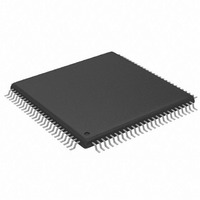PIC18F96J60T-I/PF Microchip Technology, PIC18F96J60T-I/PF Datasheet - Page 318

PIC18F96J60T-I/PF
Manufacturer Part Number
PIC18F96J60T-I/PF
Description
64KB Flash, 12KB RAM, 10BASE-T Ethernet 100 TQFP 14x14x1mm T/R
Manufacturer
Microchip Technology
Series
PIC® 18Fr
Datasheets
1.PIC16F616T-ISL.pdf
(8 pages)
2.PIC18F66J65-IPT.pdf
(8 pages)
3.PIC18F66J65-IPT.pdf
(480 pages)
4.PIC18F66J65-IPT.pdf
(4 pages)
5.PIC18F66J65-IPT.pdf
(10 pages)
6.PIC18F96J60-IPT.pdf
(24 pages)
Specifications of PIC18F96J60T-I/PF
Core Processor
PIC
Core Size
8-Bit
Speed
41.667MHz
Connectivity
EBI/EMI, Ethernet, I²C, SPI, UART/USART
Peripherals
Brown-out Detect/Reset, POR, PWM, WDT
Number Of I /o
70
Program Memory Size
64KB (32K x 16)
Program Memory Type
FLASH
Ram Size
3808 x 8
Voltage - Supply (vcc/vdd)
2 V ~ 3.6 V
Data Converters
A/D 16x10b
Oscillator Type
Internal
Operating Temperature
-40°C ~ 85°C
Package / Case
100-TQFP, 100-VQFP
Processor Series
PIC18F
Core
PIC
Data Bus Width
8 bit
Data Ram Size
3808 B
Interface Type
Display Driver, Ethernet, EUSART, I2C, MSSP, SPI
Maximum Clock Frequency
41.667 MHz
Number Of Programmable I/os
70
Number Of Timers
5
Maximum Operating Temperature
+ 85 C
Mounting Style
SMD/SMT
3rd Party Development Tools
52715-96, 52716-328, 52717-734, 52712-325, EWPIC18
Development Tools By Supplier
PG164130, DV164035, DV244005, DV164005, PG164120, DM183033, DV164136
Minimum Operating Temperature
- 40 C
On-chip Adc
10 bit, 16 Channel
Lead Free Status / RoHS Status
Lead free / RoHS Compliant
For Use With
AC164333 - MODULE SKT FOR PM3 100QFPAC162064 - HEADER INTFC MPLABICD2 64/80/100
Eeprom Size
-
Lead Free Status / Rohs Status
Details
Available stocks
Company
Part Number
Manufacturer
Quantity
Price
Company:
Part Number:
PIC18F96J60T-I/PF
Manufacturer:
Microchip Technology
Quantity:
10 000
- PIC16F616T-ISL PDF datasheet
- PIC18F66J65-IPT PDF datasheet #2
- PIC18F66J65-IPT PDF datasheet #3
- PIC18F66J65-IPT PDF datasheet #4
- PIC18F66J65-IPT PDF datasheet #5
- PIC18F96J60-IPT PDF datasheet #6
- Current page: 318 of 480
- Download datasheet (8Mb)
signals from RS-232 to TTL levels also perform an inver-
buffering without inverting the signal.
PIC18F97J60 FAMILY
20.2.2
The receiver block diagram is shown in Figure 20-6.
The data is received on the RXx pin and drives the data
recovery block. The data recovery block is actually a
high-speed shifter operating at x16 times the baud rate,
whereas the main receive serial shifter operates at the
bit rate or at F
in RS-232 systems.
The RXDTP bit (BAUDCON<5>) allows the RXx signal
to be inverted (polarity reversed). Devices that buffer
sion of the signal (when RS-232 = positive, TTL = 0).
Inverting the polarity of the RXx pin data by setting the
RXDTP bit allows for the use of circuits that provide
To set up an Asynchronous Reception:
1.
2.
3.
4.
5.
6.
7.
8.
9.
10. If any error occurred, clear the error by clearing
11. If using interrupts, ensure that the GIE and PEIE
DS39762E-page 318
Initialize the SPBRGHx:SPBRGx registers for
the appropriate baud rate. Set or clear the
BRGH and BRG16 bits, as required, to achieve
the desired baud rate.
Enable the asynchronous serial port by clearing
the SYNC bit and setting bit, SPEN.
If the signal at the RXx pin is to be inverted, set
the RXDTP bit.
If interrupts are desired, set enable bit, RCxIE.
If 9-bit reception is desired, set bit, RX9.
Enable the reception by setting bit, CREN.
Flag bit, RCxIF, will be set when reception is
complete and an interrupt will be generated if
enable bit, RCxIE, was set.
Read the RCSTAx register to get the 9th bit (if
enabled) and determine if any error occurred
during reception.
Read the 8-bit received data by reading the
RCREGx register.
enable bit, CREN.
bits in the INTCON register (INTCON<7:6>) are
set.
EUSARTx ASYNCHRONOUS
RECEIVER
OSC
. This mode would typically be used
20.2.3
This mode would typically be used in RS-485 systems.
To set up an Asynchronous Reception with Address
Detect Enable:
1.
2.
3.
4.
5.
6.
7.
8.
9.
10. Read RCREGx to determine if the device is
11. If any error occurred, clear the CREN bit.
12. If the device has been addressed, clear the
Initialize the SPBRGHx:SPBRGx registers for
the appropriate baud rate. Set or clear the
BRGH and BRG16 bits, as required, to achieve
the desired baud rate.
Enable the asynchronous serial port by clearing
the SYNC bit and setting the SPEN bit.
If the signal at the RXx pin is to be inverted, set
the RXDTP bit. If the signal from the TXx pin is
to be inverted, set the TXCKP bit.
If interrupts are required, set the RCEN bit and
select the desired priority level with the RCxIP bit.
Set the RX9 bit to enable 9-bit reception.
Set the ADDEN bit to enable address detect.
Enable reception by setting the CREN bit.
The RCxIF bit will be set when reception is
complete. The interrupt will be Acknowledged if
the RCxIE and GIE bits are set.
Read the RCSTAx register to determine if any
error occurred during reception, as well as read
bit 9 of data (if applicable).
being addressed.
ADDEN bit to allow all received data into the
receive buffer and interrupt the CPU.
SETTING UP 9-BIT MODE WITH
ADDRESS DETECT
© 2009 Microchip Technology Inc.
Related parts for PIC18F96J60T-I/PF
Image
Part Number
Description
Manufacturer
Datasheet
Request
R

Part Number:
Description:
Manufacturer:
Microchip Technology Inc.
Datasheet:

Part Number:
Description:
Manufacturer:
Microchip Technology Inc.
Datasheet:

Part Number:
Description:
Manufacturer:
Microchip Technology Inc.
Datasheet:

Part Number:
Description:
Manufacturer:
Microchip Technology Inc.
Datasheet:

Part Number:
Description:
Manufacturer:
Microchip Technology Inc.
Datasheet:

Part Number:
Description:
Manufacturer:
Microchip Technology Inc.
Datasheet:

Part Number:
Description:
Manufacturer:
Microchip Technology Inc.
Datasheet:

Part Number:
Description:
Manufacturer:
Microchip Technology Inc.
Datasheet:











